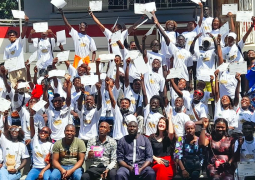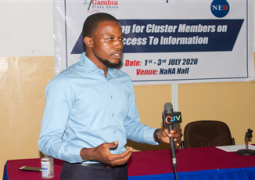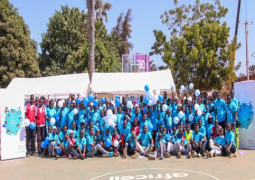
Confronted with all the stereotypes associated to farming being for illiterates and lower-class society, these young men have not only found professional satisfaction in cultivating, processing and commercializing a variety of crops such as papaya, cucumber, okra, onions, tomatoes, salad, green pepper amongst other vegetables: they are also becoming trend-setters in agribusiness.
Muhammed Jabbie obtained a Software Engineering degree in Malaysia. Today, he is passionate about contributing towards food self-sufficiency and bridging the gap between the national production capacity and the consumption demands of the growing population. He firmly believes that the country has so many potentials that can be exploited whilst reducing the import levels of basic fruit products. “Upon my return, I realized that we could change the paradigm in agriculture and make people understand that you can be educated and at the same time partake in modern farming techniques which earns just as much money as the so-called ‘white-collar jobs’.”
Despite the initial resistance from family members and relatives who considered agriculture fit for those without any formal education, Muhammed saw a niche that could be filled despite the white-collar job opportunities: “I faced a lot of challenges at family level. Like most people, they thought that farming is meant for the poor and not a person with degrees.”
The IT expert also added that he has been nurturing a passion for agriculture for a very long time. After obtaining a degree, that dream became easier to attain with an improved knowledge in global dynamics and the anticipation of introducing mechanized way of improving the agricultural value chain. “This,” he says, “might need more than innovation but also investment from the private sector and government backing.”
Together with other 49 young entrepreneurs, Muhammed benefitted from the EU-funded Tekki Fii solar grant managed by GIZ in cooperation with NACCUG which amounts to D250,000 in kind. “The grant comes in the form of a solar-powered borehole which uses solar technology to pump water for my irrigational needs. With time, my family was able to realize that this is my passion and that I can employ modern techniques to redefine the system.”
Omar Jallow is also another agropreneur who doubles as a professional Medical Microbiologist from the University of Santa Clara in Cuba. His reasons for venturing into agriculture are not so different from Muhammed’s: “My passion for agriculture is what drives me into the field. I believe farming presents one of the greatest income-generation and job creation opportunities for Sub-Saharan Africa. Agriculture also improves the socio-economic condition of millions of people around the world.” Omar’s family is very supportive of his choices. Regardless of what society thinks, he feels that he’s destined for a bigger purpose and that nothing can stop him.
He also obtained the solar grant in the form of a borehole water tank, water pump, solar power system amongst other equipment. “The solar-powered water system accorded me with year-round water supply to keep in products to meet the demands of the customers.” With a country like The Gambia that is highly dependent on rain-fed agriculture, the solar-powered water tank is clearly an added advantage to boosting the productivity of the farmers in increasing their yield and maximizing profit, hence contributing to promoting food security and job creation, amongst other economic strides.
Even though this is not so obvious to many youths, Muhammed and Omar both believe that young people should shift their attention to profitable ventures like agropreneurship in The Gambia which is blessed with water resources and fertile land. The two are looking forward to expanding their ventures with the right partnerships as well as valuable prospects for employing more youth who will learn to see the benefits of becoming agropreneurs. This, they believe, is the only way of bridging the unemployment gap instead of taking the perilous journey to Europe, or succumbing to other routes that derail the progress of Gambian youth.




